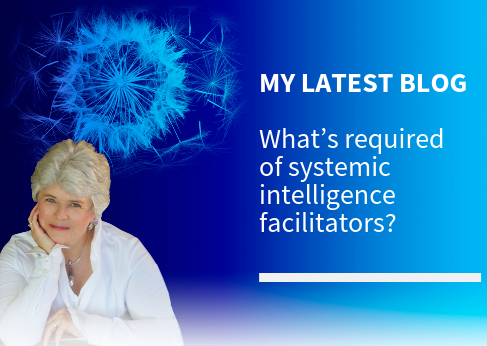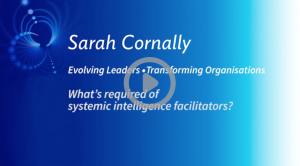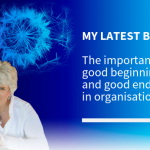
What’s required of systemic intelligence facilitators?
Systemic intelligence facilitators’ purpose is to increase their clients’ capacity to navigate complexity and ambiguity. They help reveal the intelligence of their clients’ systems, giving powerful insights and transformative new perspectives that create an expanded capacity to respond.
There are four key areas that you need to address to develop the capability to be a systemic intelligence facilitator in organisations.
Organisational and business context
The first thing that facilitators need is an understanding of the organisational context – that world, the language, how business actually functions. It is important for the client to feel they are in good hands, this requires a depth of experience in organisational development or consulting, where the nuances in that world are understood, so that you don’t show up naively. A certain degree of gravitas and business astuteness provides essential credibility.
Leadership
The second requirement is that you know how to step into a leadership position to lead your clients through the work and step out of it so they hold the responsibility that belongs to them. With systemic intelligence work, you’re introducing something considerably different – it’s essential that you enable the participants to connect with the inherent value in systemic thinking by creating credible links to the concepts. It also requires the kind of both strength and support that will lead to a good outcome in the process. If the leap is too much, they won’t buy in. Hence also pragmatic leadership education buy-in capacity is required, which often comes from a consulting skillset.
Consciousness
The third, and perhaps most crucial requirement, is the mindset and the consciousness that you bring. There are many distinctive elements to that, but as a starting point, you need to unlearn many of the mindsets and practices that you would normally use in organisational development work. It is a great asset that mindfulness is becoming far more mainstream – as that’s a very useful frame. Certainly, a non-judgemental mindset and an openness, even to the point where you may not know what the answer is until it reveals itself, is essential. That is a crucial piece, which I explain more fully below.
Tools
Finally, you need the tools, skills and techniques, where you understand systems principles, systems dynamics and the processes that we use to tune into a system, explore what’s present in the system, and reveal the systemic intelligence.
Key Mindsets
A non-judgemental mindset
A lot of people have judgmental views, both societally as well as professionally, of organisations and the people within it. However, if we’re going to serve a system we cannot afford judgements about that system. Letting go of judgements can be quite a challenge, but essential.
Letting go of being the expert
Secondly, it’s really important that you have a great sense of who you are, and what purpose you’re pursuing with doing the work. This acts as a fundamental reference point because when you step into systemic work, it’s important that you are open to anything. You’re open even to not knowing. In fact, that’s a key thing: That you can do the work, with all of your knowledge, skills, tools and techniques, but at the same time letting go of knowing, so that you can actually listen to the systems. Interestingly, there’s a trap here for us as consultants. If you worked in organisations and have done a lot of consulting, you will have become expert at analysis and differentiation. This is a key prerequisite for being a good consultant. People turn to you and look to you for your expert advice and your expert knowledge. We have to unlearn that for systemic work, because what’s key is the fact that we don’t actually know. If we’re really listening to the system, it is going to reveal things that we have no knowledge about at all. This requires giving up the comfort that we get from being an expert. That’s considerable unlearning. In the System Dynamics & Organisational Constellation Training (SD&OC Training), participants say that’s one of the toughest things to unlearn, to be able to go completely into what we call ‘an empty centre’. That’s where you listen from all of the sensory data that comes to you through your body, your consciousness, your feelings, and your sense perceptions. That becomes the most important source of information, and your mind is in the second position. For most of us, our mind is in the first position and our body’s in the second position. We reverse that with this work, which is quite a developmental pathway of its own.
Know your own system
To enter the ‘empty centre’ often involves you needing to do quite a bit of work on yourself. To understand things such as: What’s your relationship with your family system, what are the dynamics that are present in your system, what are the tendencies that you have, what blind spots do you have? Getting to intimately understand your own system and its dynamics, so that you actually have your own in-body experience of what happens when you see and understand your system differently – this gives you confidence in the work. That’s one of the things that the SD&OC training does – it builds your confidence that these systems dynamics, tools and skills actually make a difference, so that you can stand in the work with that kind of confidence. There’s a lot of work to be done on your own system both personally and professionally including how you interact with other systems.
Similarly, you also need to look at how you show up in organisational systems – what dynamics play out in you and how do they affect you – because that will get provoked when you go into serve an organisational system. It’s important to do work on this, as it affects the way you listen to a system and facilitate work in a system.
Holding space
You also need to be very good at holding space in a very specific kind of way. As a facilitator, you’re holding space for the system to reveal itself, for dynamics to emerge, and for your client to feel held, even though the work may be revealing things that the client doesn’t want to see or feel. Even if it’s difficult for them to digest, you’re actually holding space in service of the system. You’re serving your client in the sense that if they have come with a question or a difficulty and they’re wanting to find a way forward. That may mean they have to face harsh truths that are difficult. You need to sense into the field in terms of what support or resources do they need to be able to look at it and deal with it.
Altogether it’s a very rich area of mindset and consciousness – this is where the power lies in the work. You can teach the tools and techniques and skills, but if you don’t have the mindset and consciousness, it lands on shallow ground. In many ways, doing this work provokes the evolution of your consciousness. You will be very attuned to your own personal system and start to see collective systems with completely new eyes. You’ll start to generate deep respect to the universal forces at play. We are a guest in a system. As a facilitator, your role is to hold the position of being invited to be a guest in this system, while we provide service to the system, and enable our clients to find the insights they need to move forward, with respect and dignity.
Written by Sarah Cornally
Strategic Leadership Advisor
Cornally Enterprises Pty Ltd
PO Box 4413, Castlecrag NSW 2068 Australia
Fax +61 2 9475 0254









